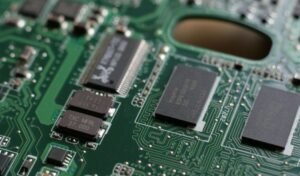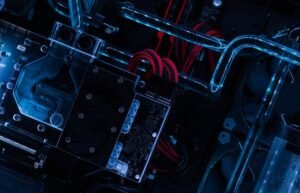Will AI Replace All Jobs?
With the rapid advancement of artificial intelligence (AI), there is growing debate and concern about the potential impact on jobs across various industries. While AI has the potential to revolutionize countless processes and industries, it is crucial to examine both the potential benefits and drawbacks. So, will AI replace all jobs? Let’s explore this topic further.
Key Takeaways:
- AI has the potential to automate repetitive tasks and improve efficiency.
- Some jobs may be at risk of being replaced by AI, but new opportunities and roles will emerge.
- Adapting skills and continuous learning are vital to remain relevant in an AI-dominated future.
Artificial intelligence, through its ability to analyze vast amounts of data and quickly process information, has the potential to automate many repetitive tasks that are currently performed by humans. This automation can lead to increased efficiency and productivity in various industries, such as healthcare, manufacturing, and customer service. *AI has the power to transform mundane and time-consuming tasks, allowing humans to focus on more critical and complex endeavors.* However, some jobs that heavily rely on repetitive tasks may face the risk of being replaced by AI-powered systems.
While it is true that AI can automate certain tasks, it is crucial to note that AI technology is not designed to replace humans entirely. Rather, AI is likely to transform existing job roles and create new opportunities. *AI can augment human capabilities by providing them with tools and insights to perform their tasks more effectively.* This shift will require individuals to adapt and upskill to take advantage of the new opportunities that arise alongside AI technologies.
The Future of Jobs in an AI World
In an AI-dominated future, new job roles and professions will emerge. While some low-skill jobs may become redundant, there will be an increased demand for individuals with the skills to work alongside AI systems. According to a World Economic Forum report, *emerging roles like data analysts, AI trainers, and cybersecurity experts will see significant growth in the coming years.* To navigate this changing landscape successfully, individuals need to focus on developing skills that are difficult to automate, such as critical thinking, creativity, problem-solving, and emotional intelligence.
Three Key Areas AI is Impacting
Artificial intelligence is already revolutionizing numerous sectors. Here are three key areas where AI is making a significant impact:
- Healthcare: AI is transforming healthcare by improving disease diagnosis, drug discovery, and personalized treatments.
- Manufacturing: AI-powered robots and automation are streamlining production processes, reducing errors, and increasing efficiency.
- Customer service: AI chatbots and virtual assistants are now able to handle basic customer inquiries, allowing human employees to focus on more complex issues and provide personalized support.
Data Points: AI and Employment
| Year | AI Jobs Created (in millions) | Jobs Replaced by AI (in millions) |
|---|---|---|
| 2020 | 2.3 | 1.8 |
| 2025 | 5.9 | 4.3 |
| 2030 | 9.7 | 6.9 |
Adapting to an AI-dominated Future
As AI technology continues to evolve, it is essential for individuals to adapt their skills and embrace lifelong learning. Here are a few strategies to thrive in an AI-dominated world:
- Continuous Learning: Stay updated with the latest industry trends and acquire new skills that complement AI technologies.
- Enhance Human Capabilities: Focus on developing skills that are difficult to automate, such as critical thinking, creativity, and emotional intelligence.
- Collaboration: Embrace partnerships between humans and AI systems to achieve better outcomes and maximize productivity.
As AI technology continues to advance, it is clear that jobs will be transformed rather than entirely replaced. *The key lies in understanding how AI can directly assist humans and finding ways to adapt to this symbiotic relationship.* By embracing AI technology and continually upgrading skills, individuals can thrive and achieve success in the ever-evolving job market of the future.

Common Misconceptions
The AI takeover
One common misconception is that artificial intelligence (AI) will replace all jobs in the future. While AI certainly has the potential to automate certain tasks and make certain roles obsolete, it is unlikely to completely eradicate all jobs.
- AI will augment human capabilities, enabling us to focus on more complex and creative tasks.
- Jobs that require human empathy, critical thinking, and emotional intelligence are unlikely to be taken over by AI.
- New jobs will be created in response to advancements in AI technology.
Job security concerns
Another misconception is that widespread implementation of AI will inevitably lead to job insecurity and unemployment. While there may be some changes in the job market, it is important to consider the potential for job transformation rather than complete job loss.
- AI will create new roles and industries that we cannot even anticipate yet.
- Jobs can be redesigned and transitioned to complement AI systems instead of being replaced by them.
- Skills that are valuable in the AI era, such as programming and data analysis, will become increasingly in demand.
AI as a threat
Many people perceive AI as a threat that will overthrow human control and disrupt societal order. This perception stems from a misconception about the purpose and capabilities of AI systems.
- AI is designed to be a tool that supports human decision-making rather than a replacement for human judgment.
- AI systems can be carefully regulated and monitored to ensure they align with human values and ethics.
- Humans will always be responsible for programming and overseeing AI, ensuring accountability and control.
Universality of AI
Another misconception is that AI will be universally applicable to all industries and job sectors. While AI has the potential to be implemented in various domains, its suitability and benefits may vary depending on the industry or job in question.
- Certain industries and jobs may not benefit from AI automation due to their complexity or unique nature.
- AI solutions need to be specifically tailored and trained for each task or industry, making universal application impractical in many cases.
- In some cases, AI may be more effective as a complementary tool to enhance human performance rather than replacing it altogether.
Immediate job risk
Lastly, the misconception that AI will eliminate jobs imminently is prevalent. While the technology is advancing rapidly, the complete replacement of human jobs will likely be a gradual process that requires significant technological advancements.
- AI is currently better suited to automating routine and repetitive tasks rather than complex cognitive tasks.
- It will take time for AI to reach a level of sophistication that could potentially replace a wide range of jobs.
- Workforce transitions and reskilling programs can be implemented to mitigate any job displacement that may occur in the future.

Automation and Job Loss in Various Industries
As artificial intelligence (AI) continues to advance, there is growing concern about its impact on employment. Will AI replace all jobs? Let’s explore the potential disruptions in different industries by examining the data below:
The Rise of AI in the Automotive Industry
AI has made significant strides in the automotive industry, enabling the development of self-driving cars and improving safety features. However, this progress comes with the potential for job displacement:
AI’s Impact on Healthcare
The adoption of AI technologies in healthcare holds great promise for improving patient outcomes, diagnosis accuracy, and operational efficiency. However, there are concerns about job losses in certain healthcare fields:
Transforming the Manufacturing Sector with AI
Artificial intelligence is revolutionizing the manufacturing sector by enabling automation, optimization, and predictive maintenance. Take a look at the potential changes in the industry’s employment landscape:
The Future of Retail and AI
AI is reshaping the retail industry in various ways, from personalized shopping experiences to automated inventory management. Let’s examine the potential impact on retail workers:
AI’s Role in Financial Services
The financial services industry has already embraced AI in areas like fraud detection and customer service. However, this technological advancement may have implications for certain job roles:
Education and AI: Transforming the Learning Experience
AI applications in education range from adaptive learning platforms to intelligent tutoring systems. How will this affect educators and the overall educational landscape?
AI in Agriculture: Improving Efficiency and Yield
Artificial intelligence shows promise in revolutionizing agriculture through precision farming and automated machinery. What might be the consequences for agricultural labor?
The Impact of AI in Law and Legal Services
AI technologies have made their way into the legal sector, assisting with legal research and contract analysis. However, what does this mean for the future of legal professionals?
AI’s Influence on the Creative Fields
While creativity has often been considered uniquely human, AI is making inroads into creative tasks such as content generation, music composition, and even painting. How will this reshape creative industries?
Artificial intelligence brings both opportunities and challenges. While it may eliminate some jobs, it also creates new roles and enhances productivity in various sectors. To navigate the future of work successfully, a proactive approach that leverages the strengths of both humans and AI will be crucial.
Will AI Replace All Jobs? – Frequently Asked Questions
What is AI?
AI stands for Artificial Intelligence. It refers to the simulation of human intelligence in machines that are programmed to think and learn like humans.
Will AI replace all jobs in the future?
While AI has the potential to automate some jobs, it is unlikely to replace all jobs. AI is more effective in automating routine and repetitive tasks, while jobs requiring creativity, critical thinking, and human interaction are less likely to be fully replaced.
Which jobs are most at risk of being replaced by AI?
Jobs that involve repetitive manual labor, data analysis, routine customer service interactions, and basic administrative tasks are more susceptible to being replaced by AI.
Can AI create new jobs?
Yes, AI has the potential to create new jobs. As automation takes over certain tasks, new job roles are likely to emerge that focus on managing and developing AI technology, data analysis, and other areas where human skills complement AI capabilities.
Will AI outperform humans in every job?
While AI is becoming increasingly capable, there are still areas where human expertise and intuition excel. Jobs that require complex problem-solving, emotional intelligence, adaptability, and creative thinking are less likely to be outperformed by AI.
How can humans adapt to the rise of AI?
To adapt to the rise of AI, humans can focus on developing skills that complement AI capabilities, such as creativity, emotional intelligence, complex problem-solving, and critical thinking. Lifelong learning and upskilling can also help individuals stay relevant in a changing job market.
Is AI a threat to employment?
While AI may automate certain tasks and lead to job displacement, it also has the potential to create new job opportunities. The impact of AI on employment is likely to vary across industries and job roles.
Can AI be controlled to avoid negative consequences?
Efforts are being made to develop ethical guidelines and regulations around the use of AI to avoid negative consequences. It is crucial for policymakers, researchers, and developers to ensure responsible and transparent use of AI to mitigate potential risks.
Is AI already replacing jobs today?
AI is already being integrated into various industries, automating certain tasks and impacting employment. However, the full-scale replacement of jobs by AI is still a gradual process and varies across sectors.
Will AI enhance job productivity and efficiency?
Yes, AI has the potential to enhance job productivity and efficiency by automating routine tasks, analyzing vast amounts of data, and providing valuable insights. This can free up time for employees to focus on more complex and strategic aspects of their work.





